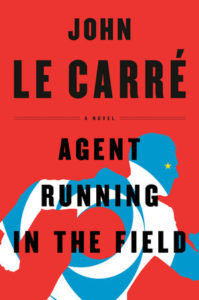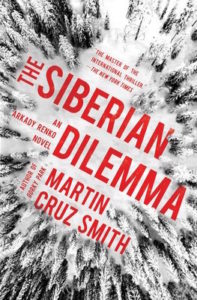Up until a few years ago, one could consider espionage fiction to be one of the last bastions of an old-school narrative form dedicated to the James Bond model (sex, adventure, alcohol), or the Graham Greene/John le Carré model (guilt, misadventure, more alcohol). Lately, however, spy fiction has been opening up to new voices, while continuing to pay tribute to the traditions of the genre. Last year heralded a new era of complex espionage by women, and this year continues the trend, with women crafting many of the year’s best entries. Works of nonfiction increasingly introduce us to the long-ago, and long-erased, heroics of women in espionage. Le Carré-style fiction takes us into the lives of the marginalized, exploited for their identities, and torn between loyalties. Female adventurers increasingly appear as the stars of Bond-esque thrillers, too. Small nations flooded by international agents increasingly defend the right to tell their own stories. And the giants of the genre continued to craft twisting, intricate narratives of secrets, lies, and government agents.
Below, you’ll find a varied landscape of espionage, taking place on a vast international stage, and from which we may draw the central threads of 20th century history (and the key to their future unravellings). Behold, the best espionage and spy fiction of 2019.

Lauren Wilkinson, American Spy (Random House)
We were tempted to also stick this one in the historical fiction category, but decided calling the 1980s setting “historical” would make us feel old. In Lauren Wilkinson’s brilliant and self-assured debut, Marie, a young black woman working a dead-end job for the FBI, gets an opportunity for advancement when her bosses recruit her to seduce and entrap the charismatic president of Sierra Leone before he can fully implement his revolutionary goals. Torn between her career and her heart, which will Marie choose?

Lara Prescott, The Secrets We Kept (Knopf)
Lara Prescott’s lush, romantic tale of love, literature, and spycraft takes us into the CIA’s bizarre plot to draw Russians away from communism and towards the West through spreading Boris Pasternak’s love story of the Russian Revolution, Dr. Zhivago, throughout the USSR. Prescott’s splits her scintillating debut between the travails of Pasternak’s mistress and the CIA intrigues of the women tasked with smuggling copies of the incendiary novel to its intended audience.

Antanas Sileikas, Provisionally Yours (Biblioasis)
This one wins for best use of horseradish in a spy novel. When a former soldier fresh from the Russian Civil War finds himself uniquely qualified to head the new Lithuanian state’s fledgling intelligence agency, he’s quickly embroiled in dangerous intrigue with the American diplomat and his glamorous Lithuanian wife. With equal parts glam, grit, and gallows humor, this one is not to be missed (especially for those who enjoy stories of scrappy little states facing up against bullies far and wide).

Lee Goldberg, Killer Thriller (Thomas and Mercer)
Goldberg’s thrillers are some of the wittiest around, and his newest doesn’t disappoint. A thriller author visiting China on a research jaunt is suspected of being a spy because, well, his thrillers keep managing to come true, and the plot he’s researching in China just happens to be unfolding unbeknownst to him or anyone else outside the government. Goldberg manages a meta-thriller that’s genuinely heart-pounding but also clever enough to keep you smiling and reading on.

John le Carré, Agent Running in the Field (Viking)
It’s one of the marvels of the literary moment that John le Carré is not only back writing spy novels, but writing novels, at age 88, of genuine verve and vigor, stories that ripple with outrage at recent developments in the world while still maintaining the cooling cynicism that has marked the author’s impressive body of work. In his latest, a British spy and his London badminton partner discuss the state of the world. Their conversation, while at times outraged, carries double and hidden meanings, eventually dragging them into a new kind of game. Agent Running in the Field is a powerful novel about betrayal, a country selling out its ideals, and the kind of everyday duplicities that mark the lives of le Carré’s most fascinating, enduring characters.

Joseph Kanon, The Accomplice (Atria)
Kanon is besotted with the complexities of the long aftermath of WWII. His latest, The Accomplice, takes us on a Nazi hunter’s last quest—an old man spots a Nazi doctor who never came to justice, and sends his CIA-employed nephew to Buenos Aires to bring the doctor to justice. When Kanon’s CIA protagonist arrives in Argentina, he plans to infiltrate the German ex-pat community through seducing the war criminal’s daughter, herself an ambiguous figure who represents the torn allegiances of post-war Germany. (MO)

Daniel Silva, The New Girl (Harper)
Silva is, quite simply, the best and most prolific spy novelist of his generation; for heady, geopolitically intricate, emotionally nuanced stories combined with genuinely gripping action, you just can’t beat the Gabriel Allon series. In Silva’s latest novel, a mysterious young woman at a Swiss boarding school is kidnapped from under the nose of her large security team, and Allon is called in to help avert yet another international crisis.

Alan Furst, Under Occupation (Random House)
Alan Furst started out writing perfectly plotted and darkly atmospheric espionage novels set during the lead up to World War II; his novels have taken us ever closer to, then into the midst, of war, and his latest, set during 1942, melds his trademark research and behind-the-scenes settings for a tale of occupied Paris, where French resistance fighters work desperately against their Nazi occupiers, even as a far larger number of their compatriots are collaborating with their new masters. (MO)

Martin Cruz Smith, The Siberian Dilemma (Simon & Schuster)
In this chilling thriller, Arkady Renko, a Moscow-based investigator, is worried about the long absence of his girlfriend, Tatiana Petrovna, a journalist famous for deep-cover assignments that require her to seemingly-vanish. But when she does not return, Renko knows in his heart that something has gone wrong, and starts tracking her down. He discovers that she has been working on a piece about a young wealthy man named Mikhail Kuznetsov, a dissenter poised to take on Putin and end decades of political corruption. But Kuznetsov’s best friend and business associate has turned up dead, and suddenly matters are far more occluded and distorted for Renko than they had once seemed. Now, barely has time to find Tatiana, and bring them both back in from the cold.—OR

Emma Donoghue, Akin (Little, Brown)
Emma Donoghue’s latest book functions on several levels: it’s a heart-warming family story, a meditation on grief and loss, and an investigation into clandestine activities from days of yore. An elderly widower is about to visit his childhood home in the South of France when he’s saddled with temporary guardianship for his grandson after the boy’s previous guardian suddenly dies. The old man finds evidence that his mother was involved in secretive operations during WWII, but was she collaborating, or was she resisting? It’s up to the unlikely duo to find out.
___________________________________
Notable Selections
___________________________________
Anna Lee Huber, Penny for Your Secrets · Miles Millar and Alfred Gough, Double Exposure · Chris Pavone, The Paris Diversion · Elisabeth Elo, Finding Katarina M. · Charles Cumming, The Moroccan Girl · Tom Bradby, Secret Service · Ji-Min Lee, The Spy and the Starlet · Mick Herron, Joe Country ·

















